-
 Bitcoin
Bitcoin $103,528.9455
1.74% -
 Ethereum
Ethereum $2,640.2435
8.75% -
 Tether USDt
Tether USDt $0.9998
-0.04% -
 XRP
XRP $2.5553
4.71% -
 Solana
Solana $179.9792
7.01% -
 BNB
BNB $660.2916
2.69% -
 USDC
USDC $0.9997
-0.04% -
 Dogecoin
Dogecoin $0.2386
9.03% -
 Cardano
Cardano $0.8165
5.03% -
 TRON
TRON $0.2716
3.73% -
 Sui
Sui $3.9640
3.22% -
 Chainlink
Chainlink $17.1893
6.51% -
 Avalanche
Avalanche $26.0265
10.40% -
 Stellar
Stellar $0.3105
4.05% -
 Shiba Inu
Shiba Inu $0.0...01608
8.14% -
 Hedera
Hedera $0.2124
5.09% -
 Pi
Pi $1.2611
19.49% -
 Toncoin
Toncoin $3.4395
7.21% -
 Hyperliquid
Hyperliquid $25.4158
7.55% -
 Polkadot
Polkadot $5.1776
6.78% -
 UNUS SED LEO
UNUS SED LEO $8.7878
2.26% -
 Bitcoin Cash
Bitcoin Cash $408.3998
3.95% -
 Litecoin
Litecoin $103.3464
2.61% -
 Monero
Monero $346.8209
4.15% -
 Pepe
Pepe $0.0...01399
7.81% -
 Bitget Token
Bitget Token $4.8001
3.92% -
 Dai
Dai $0.9998
-0.02% -
 Ethena USDe
Ethena USDe $1.0004
-0.04% -
 Uniswap
Uniswap $6.8937
5.19% -
 Bittensor
Bittensor $460.5593
3.00%
How to prevent Bitcoin wallet addresses from being hacked?
Protecting your Bitcoin hinges on safeguarding your private key, not your public address. Use a hardware wallet, strong passwords, and multi-factor authentication; avoid phishing scams and public Wi-Fi.
Mar 05, 2025 at 09:54 pm

How to Prevent Bitcoin Wallet Addresses from Being Hacked?
Key Points:
- Understanding the Vulnerability: Bitcoin wallet addresses themselves aren't directly hacked. The vulnerability lies in the private keys associated with those addresses. Hackers target the methods used to store and access these private keys.
- Secure Key Storage: The most crucial step is employing robust methods for storing private keys, ranging from hardware wallets to secure software solutions. Avoid storing keys on easily compromised devices or in easily accessible files.
- Software and Hardware Security: Regularly updating software, using strong passwords, and opting for reputable hardware wallets are paramount to mitigating risks. Consider using multi-factor authentication wherever available.
- Phishing and Social Engineering Awareness: Educating oneself about phishing scams and social engineering tactics is vital. Be wary of unsolicited emails, messages, and websites that request your private keys or seed phrases.
- Operational Security: Practicing good operational security habits, such as using strong and unique passwords, regularly backing up your keys securely, and avoiding public Wi-Fi for sensitive transactions, significantly reduces the risk of compromise.
How to Prevent Bitcoin Wallet Addresses from Being Hacked?
The security of your Bitcoin isn't about protecting the address itself – the address is public and readily visible on the blockchain. The real target is your private key. This secret code grants you sole access to the Bitcoin associated with a specific address. If a hacker gains control of your private key, they effectively control your Bitcoin. Therefore, preventing hacks boils down to protecting your private keys with unwavering vigilance.
- 1. Choosing the Right Wallet Type and Implementing Secure Key Storage:
This is arguably the most critical step. The method you use to store your private keys directly impacts your vulnerability. There's no single "best" solution, as the optimal choice depends on your technical expertise, risk tolerance, and the amount of Bitcoin you hold.
Let's delve into the various options:
- Hardware Wallets: These are physical devices designed specifically for secure cryptocurrency storage. They store your private keys offline, making them incredibly resistant to hacking attempts targeting online systems. Reputable hardware wallets like Ledger and Trezor offer advanced security features like tamper-proof enclosures and secure elements, effectively isolating your private keys from the outside world. However, even hardware wallets require careful handling. Never disclose your seed phrase to anyone, and be wary of phishing attempts that might try to trick you into revealing it. Always ensure you are purchasing from the official manufacturer's website to avoid counterfeit devices. Regular firmware updates are also crucial to maintain the highest level of security. Consider the cost and convenience factors; hardware wallets are generally more expensive than software wallets but offer a higher degree of security.
- Software Wallets: These wallets store your private keys on your computer or mobile device. While convenient, they are significantly more vulnerable than hardware wallets. Software wallets are susceptible to malware, viruses, and keyloggers. If your device is compromised, your private keys are at risk. To mitigate this, choose reputable software wallets with strong security reputations, keep your software updated, use strong and unique passwords, and enable two-factor authentication (2FA) whenever possible. Regularly back up your wallet files, but store them securely, preferably offline and encrypted. Consider using a passphrase to further enhance security. The convenience of software wallets comes at the cost of increased risk, and careful management is essential.
- Paper Wallets: These are arguably the most secure method, but also the least convenient. A paper wallet involves printing your public and private keys onto paper, which you then store securely offline. The absence of digital interaction makes it highly resistant to hacking, but loss or damage to the paper renders your Bitcoin irretrievably lost. Ensure you create your paper wallet using a reputable and verified offline method to prevent tampering. Storing multiple copies in different secure locations is recommended to mitigate the risk of loss. However, the inconvenience and risk of loss associated with paper wallets make them a less practical option for most users.
- 2. Implementing Strong Security Practices for Software and Hardware:
Irrespective of your chosen wallet type, implementing robust security practices is paramount. This includes:
- Regular Software Updates: Always keep your operating system, antivirus software, and wallet software updated. Updates often include critical security patches that address vulnerabilities exploited by hackers. Neglecting updates exposes your system to known security risks.
- Strong Passwords and Passphrases: Utilize strong, unique passwords for all your accounts, especially your wallet. Avoid using easily guessable passwords or reusing passwords across multiple platforms. Consider using a password manager to generate and store strong, unique passwords securely. If your wallet supports passphrases, using a long, complex passphrase significantly enhances the security of your private keys.
- Two-Factor Authentication (2FA): Enable 2FA whenever possible. This adds an extra layer of security, requiring a second verification method (such as a code sent to your phone) in addition to your password. Even if a hacker obtains your password, they'll still need access to your second verification method to gain access to your wallet.
- Antivirus and Anti-malware Software: Install and regularly update reputable antivirus and anti-malware software on all devices used to access your Bitcoin wallet. This helps protect against malware that could steal your private keys or compromise your system. Regular scans are recommended to identify and remove any potential threats.
- Firewall Protection: Ensure that your firewall is enabled and configured correctly to protect your system from unauthorized access. A properly configured firewall can help prevent malicious actors from accessing your wallet and stealing your private keys.
- 3. Recognizing and Avoiding Phishing and Social Engineering Attacks:
Phishing and social engineering are common tactics used by hackers to trick users into revealing their private keys or seed phrases. Be vigilant and aware of these techniques:
- Suspicious Emails and Messages: Never click on links or download attachments from unsolicited emails or messages that claim to be from cryptocurrency exchanges, wallet providers, or other legitimate entities. Legitimate organizations will never ask for your private keys or seed phrase via email or direct message.
- Fake Websites: Be wary of websites that look similar to legitimate cryptocurrency exchanges or wallet providers. Double-check the URL to ensure you're on the correct website. Look for signs of fraudulent activity such as poor grammar, unusual domain names, and missing security certificates.
- Social Engineering: Be cautious of individuals who try to manipulate you into revealing your private keys or seed phrase. They may pose as customer support representatives, technical experts, or other trustworthy individuals. Never share your private keys or seed phrase with anyone, regardless of how trustworthy they may seem. Legitimate support representatives will never request this information.
- Public Wi-Fi: Avoid accessing your Bitcoin wallet while connected to public Wi-Fi networks. These networks are often unsecured, making it easier for hackers to intercept your data. Use a secure VPN if you must use public Wi-Fi for online transactions.
- 4. Practicing Good Operational Security:
Good operational security habits can significantly reduce your risk of being hacked. This includes:
- Strong and Unique Passwords: Use strong, unique passwords for all your online accounts, especially your Bitcoin wallet. Avoid using easily guessable passwords or reusing passwords across multiple platforms.
- Regular Backups: Regularly back up your wallet files and seed phrase, but store them securely offline and encrypted. Consider using multiple backup methods and storing them in separate locations. Never store backups on the same device as your wallet.
- Offline Transactions: Whenever possible, perform Bitcoin transactions offline to minimize the risk of interception. This is particularly important for large transactions.
- Secure Operating Systems: Use a secure operating system that is regularly updated and patched. This helps protect against malware and other security threats.
- Software Security: Only download and install software from trusted sources. Avoid downloading software from untrusted websites or file-sharing platforms. Regularly scan your computer for malware and other threats.
- 5. Staying Informed and Adapting to Evolving Threats:
The cryptocurrency landscape is constantly evolving, and so are the tactics used by hackers. Staying informed about the latest security threats and best practices is essential for protecting your Bitcoin. Follow reputable cryptocurrency news sources, security blogs, and wallet provider announcements to stay updated on potential vulnerabilities and security updates. Regularly review your security practices and adapt them as needed to stay ahead of evolving threats. Engage with the cryptocurrency community to learn from others' experiences and best practices. This continuous learning process is crucial in maintaining the security of your Bitcoin.
FAQs:
Q: What is a seed phrase, and why is it so important?
A: A seed phrase (also called a recovery phrase) is a list of words that acts as a master key to your Bitcoin wallet. It allows you to recover access to your wallet if you lose your device or need to restore your wallet to a new device. The seed phrase is incredibly important because it gives complete control over your Bitcoin. Never share it with anyone, and store it securely offline. Losing your seed phrase means losing access to your Bitcoin permanently.
Q: What should I do if I suspect my Bitcoin wallet has been compromised?
A: If you suspect your Bitcoin wallet has been compromised, act quickly. Immediately change all your passwords and enable 2FA wherever possible. Monitor your wallet balance closely and report any suspicious activity to the appropriate authorities or your wallet provider. If you believe your private keys have been stolen, your Bitcoin may be irretrievably lost. Prevention is always better than cure.
Q: Are all Bitcoin wallets equally secure?
A: No, Bitcoin wallets vary significantly in their security features and levels of protection. Hardware wallets generally offer the highest level of security, while software wallets are more vulnerable to hacking attempts. The security of your wallet also depends on your own security practices. Even the most secure wallet can be compromised if you don't follow good security practices.
Q: How often should I update my wallet software?
A: You should update your wallet software as soon as updates are released. Updates often include critical security patches that address vulnerabilities exploited by hackers. Neglecting updates exposes your system to known security risks. Check your wallet provider's website or app store for the latest updates.
Q: Can I recover my Bitcoin if I lose my private keys?
A: If you lose your private keys, recovering your Bitcoin is typically impossible. Your private keys are the only way to access your Bitcoin, and without them, your funds are effectively lost. This underscores the importance of secure key storage and regular backups. Never lose your seed phrase.
Disclaimer:info@kdj.com
The information provided is not trading advice. kdj.com does not assume any responsibility for any investments made based on the information provided in this article. Cryptocurrencies are highly volatile and it is highly recommended that you invest with caution after thorough research!
If you believe that the content used on this website infringes your copyright, please contact us immediately (info@kdj.com) and we will delete it promptly.
- Man Finds 1469 Roman Coins Buried in a Romanian Field
- 2025-05-14 12:05:13
- VanEck Launches VBILL, a Tokenized Fund That Enables Access to Short-Term US Treasuries On-Chain
- 2025-05-14 12:05:13
- United States President Donald Trump Will Probably Trigger an Indirect Crypto Market Rally
- 2025-05-14 12:00:31
- MEXC Points to Bitcoin Dominance Drop and Ethereum's Surge as Signs of a Coming Altcoin Season
- 2025-05-14 12:00:31
- Looking to Buy the Next Big Cryptocurrency? These 3 Cryptos Could Skyrocket This Year
- 2025-05-14 11:55:13
- Bitcoin Set for “Mega Expansion” as Chart Signals Parabolic Price Spike
- 2025-05-14 11:55:13
Related knowledge
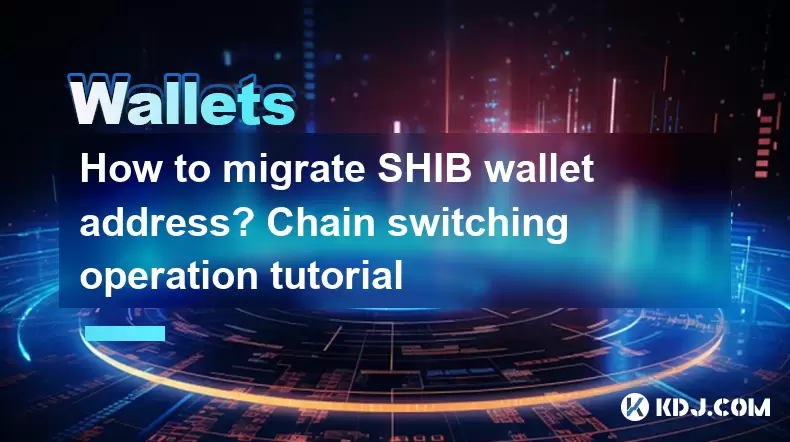
How to migrate SHIB wallet address? Chain switching operation tutorial
May 14,2025 at 07:35am
Migrating your SHIB wallet address and performing a chain switching operation can be crucial for managing your cryptocurrency effectively. This process involves several steps that need to be followed carefully to ensure that your assets remain secure and accessible. In this tutorial, we will guide you through the process of migrating your SHIB wallet ad...
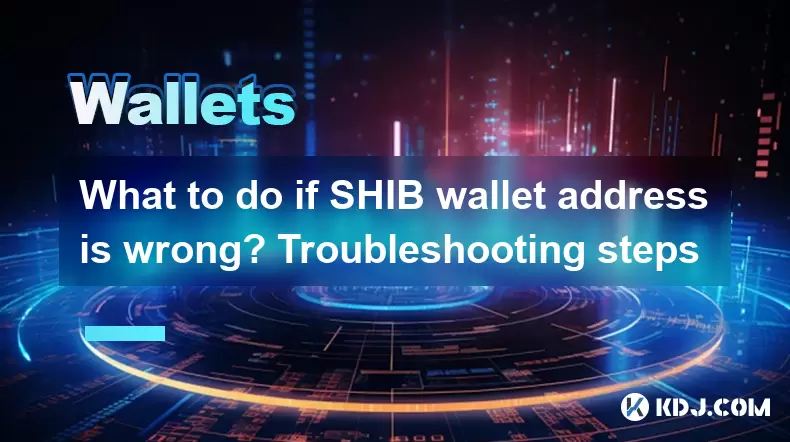
What to do if SHIB wallet address is wrong? Troubleshooting steps
May 14,2025 at 04:28am
If you've entered the wrong SHIB wallet address, it can be a stressful situation, especially if you've already sent your SHIB tokens. However, there are several steps you can take to troubleshoot and potentially resolve the issue. Let's walk through the process step-by-step. Verify the Transaction DetailsThe first thing you should do is verify the trans...
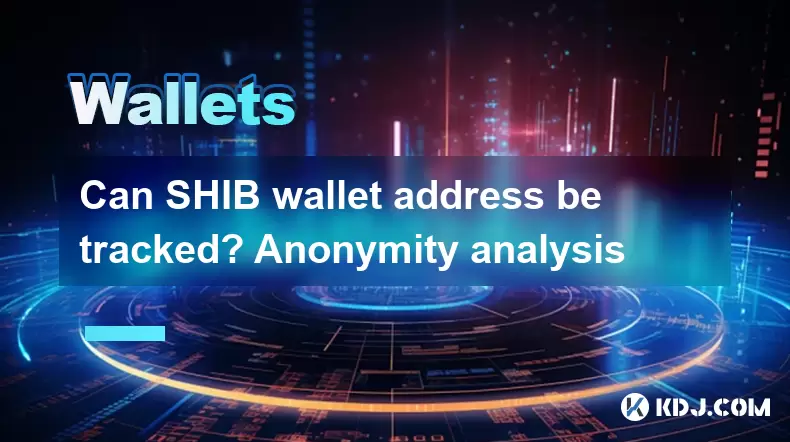
Can SHIB wallet address be tracked? Anonymity analysis
May 14,2025 at 06:50am
The question of whether a SHIB wallet address can be tracked and the level of anonymity it provides is a crucial concern for many users in the cryptocurrency space. SHIB, or Shiba Inu, is a popular meme token that operates on the Ethereum blockchain. Understanding the traceability of SHIB wallet addresses involves delving into the nature of blockchain t...
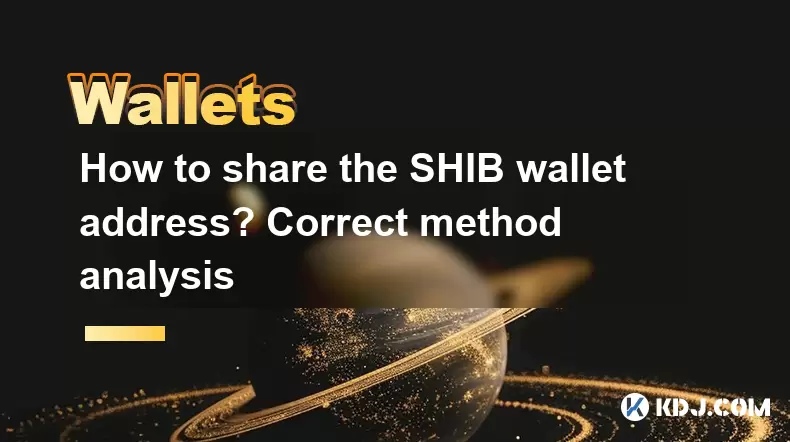
How to share the SHIB wallet address? Correct method analysis
May 14,2025 at 02:50am
Sharing your SHIB wallet address is a common task for those involved in the cryptocurrency world, particularly if you're dealing with Shiba Inu (SHIB) tokens. However, it's crucial to understand the correct methods to share your wallet address to ensure the safety and security of your funds. This article will guide you through the process and highlight ...
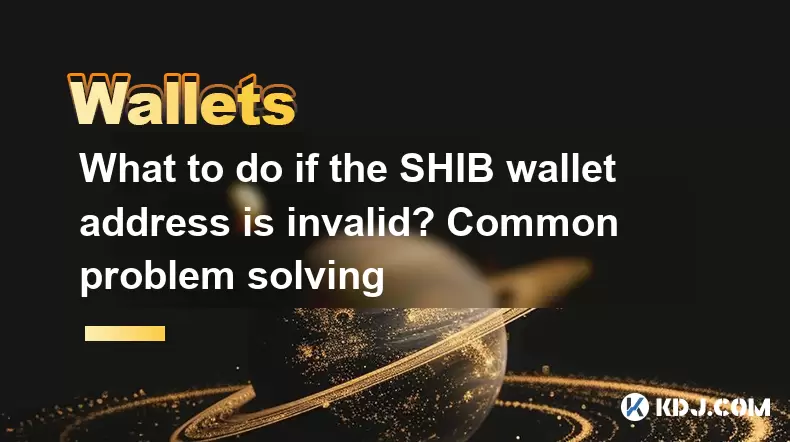
What to do if the SHIB wallet address is invalid? Common problem solving
May 14,2025 at 09:14am
If you're dealing with an invalid SHIB wallet address, it can be a frustrating experience, especially if you're trying to send or receive SHIB tokens. Understanding why this happens and how to solve it is crucial for anyone involved in the cryptocurrency space. This article will guide you through the common issues associated with an invalid SHIB wallet ...
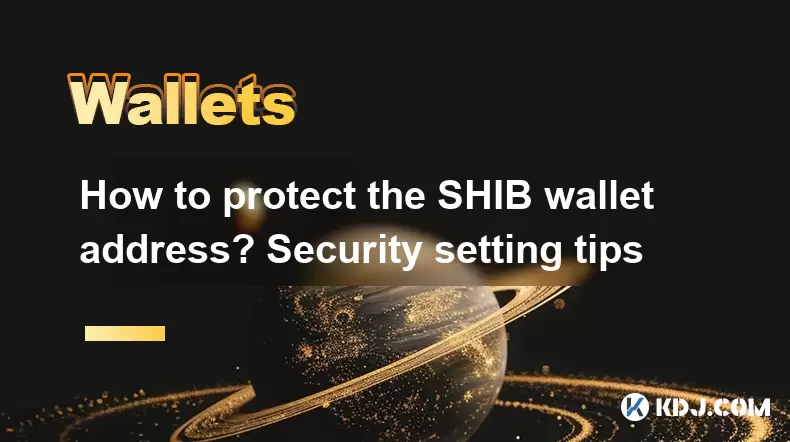
How to protect the SHIB wallet address? Security setting tips
May 13,2025 at 04:07pm
Protecting your SHIB wallet address is crucial to safeguarding your cryptocurrency assets. With the rise of digital currencies, securing your wallet has become more important than ever. This article will provide you with detailed security setting tips to ensure your SHIB wallet remains safe from potential threats. Understanding SHIB Wallet SecurityBefor...

How to migrate SHIB wallet address? Chain switching operation tutorial
May 14,2025 at 07:35am
Migrating your SHIB wallet address and performing a chain switching operation can be crucial for managing your cryptocurrency effectively. This process involves several steps that need to be followed carefully to ensure that your assets remain secure and accessible. In this tutorial, we will guide you through the process of migrating your SHIB wallet ad...

What to do if SHIB wallet address is wrong? Troubleshooting steps
May 14,2025 at 04:28am
If you've entered the wrong SHIB wallet address, it can be a stressful situation, especially if you've already sent your SHIB tokens. However, there are several steps you can take to troubleshoot and potentially resolve the issue. Let's walk through the process step-by-step. Verify the Transaction DetailsThe first thing you should do is verify the trans...

Can SHIB wallet address be tracked? Anonymity analysis
May 14,2025 at 06:50am
The question of whether a SHIB wallet address can be tracked and the level of anonymity it provides is a crucial concern for many users in the cryptocurrency space. SHIB, or Shiba Inu, is a popular meme token that operates on the Ethereum blockchain. Understanding the traceability of SHIB wallet addresses involves delving into the nature of blockchain t...

How to share the SHIB wallet address? Correct method analysis
May 14,2025 at 02:50am
Sharing your SHIB wallet address is a common task for those involved in the cryptocurrency world, particularly if you're dealing with Shiba Inu (SHIB) tokens. However, it's crucial to understand the correct methods to share your wallet address to ensure the safety and security of your funds. This article will guide you through the process and highlight ...

What to do if the SHIB wallet address is invalid? Common problem solving
May 14,2025 at 09:14am
If you're dealing with an invalid SHIB wallet address, it can be a frustrating experience, especially if you're trying to send or receive SHIB tokens. Understanding why this happens and how to solve it is crucial for anyone involved in the cryptocurrency space. This article will guide you through the common issues associated with an invalid SHIB wallet ...

How to protect the SHIB wallet address? Security setting tips
May 13,2025 at 04:07pm
Protecting your SHIB wallet address is crucial to safeguarding your cryptocurrency assets. With the rise of digital currencies, securing your wallet has become more important than ever. This article will provide you with detailed security setting tips to ensure your SHIB wallet remains safe from potential threats. Understanding SHIB Wallet SecurityBefor...
See all articles






















































































